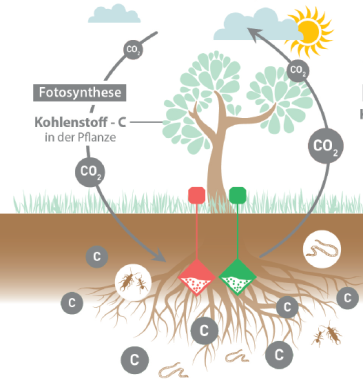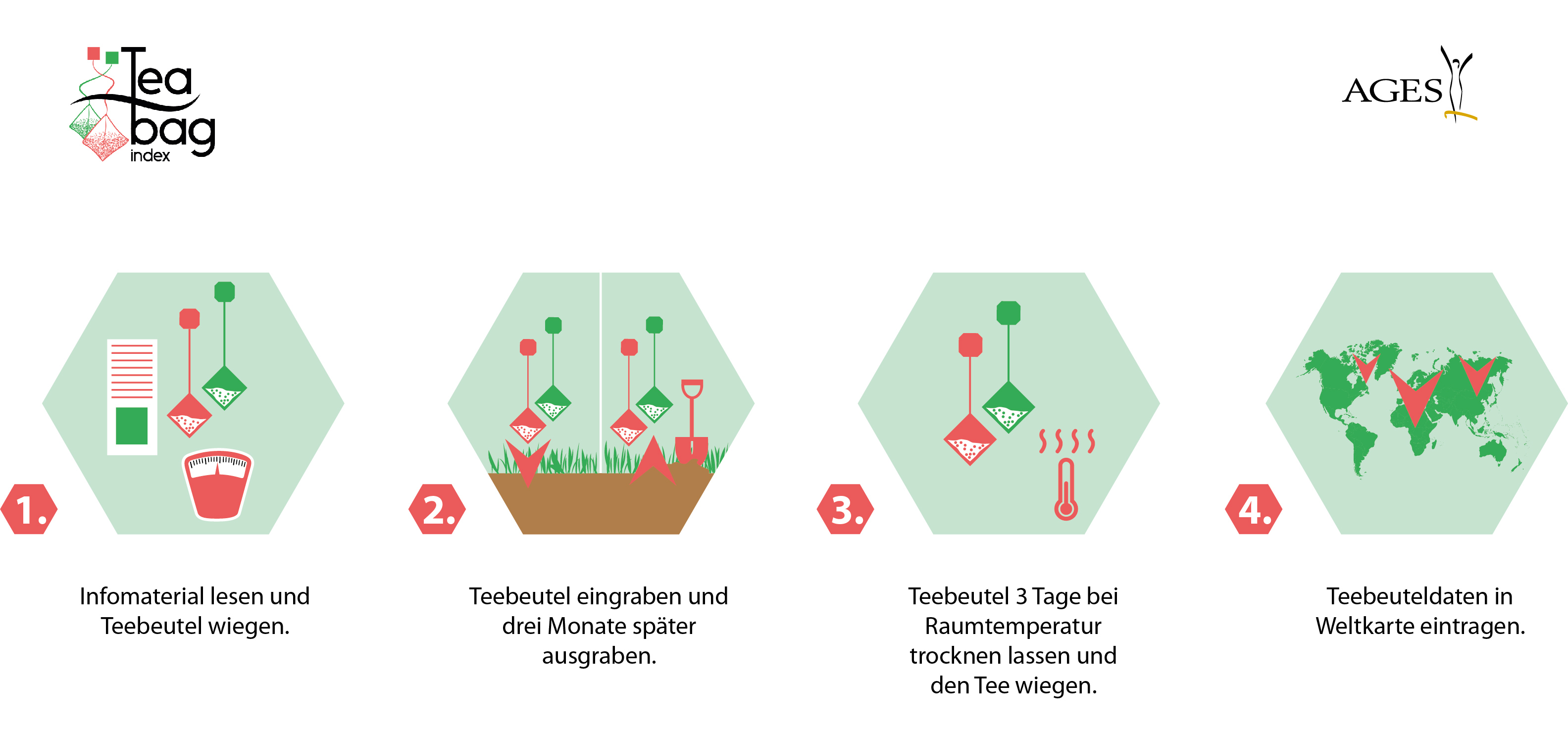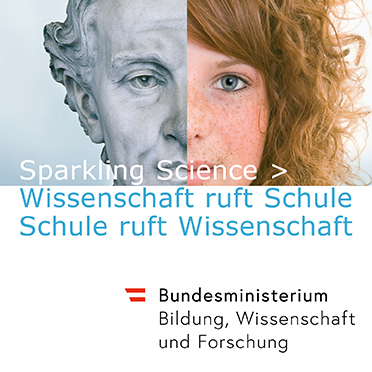What is it about?
Decomposition of organic material is crucial for the growth and metabolism of plants and microorganisms: decomposition and mineralisation make the necessary nutrients available. During this process, the greenhouse gas carbon dioxide (CO2) is released into the atmosphere as well. Rapid decomposition leads to increased CO2 emissions, while slow decomposition increases carbon storage in the soil. For a better understanding of the global C cycle, it is therefore important to gather more information about decomposition rates in different soils.

© AGES
With the Tea Bag Index, citizens worldwide can make a valuable contribution to science and the environment: They simply bury tea bags in the ground, dig them up again after 3 months and weigh them. The weight loss indicates how much plant material - in this case tea - has been decomposed. This simple and inexpensive method of determining decomposition rates is scientifically recognised, and corresponding citizen science projects have already been implemented in numerous countries around the world. With these experiments, comparable data can be obtained worldwide, especially from regions where these data have not been available so far.
Tea bag method

© AGES
At the end of this page you will also find a video describing the method in detail.
Would you like to participate?
Interested citizens can join the initiative at any time and help to investigate decomposition processes in the soil. The experiment can be carried out with the TBI app, which was developed in the CS project TeaTime4App in cooperation with the HBLFA Wieselburg and the CS platform Spotteron. The app contains step-by-step instructions for the TBI experiment and the results can be entered directly into the app. Scientists can compare these data worldwide and, for example, analyse the influence of location and soil composition on the rate of decomposition. The TBI app also contains other interesting information and CS activities about soil, e.g. texture by feel, discovering soil animals, observe soil pollution. For further information on the app you can watch the following video (in German):
Interactive map:
Results & new materials
The results of the Austrian Citizen Science Award 2016 were published together with the results of a Swedish TBI project in 2020. It was found that decomposition rates in the Pannonian environmental zone were significantly influenced by land use, with decomposition occurring most rapidly in grassland. The stabilization of labile material was significantly higher in forests than in grassland and arable land, both in the continental and in the southern Alpine zone.
Soil Sciences Education: Global Concepts and Teaching
The Austrian Tea Bag Index team, together with other soil scientists, has written the chapter “Good practices in DIY soil activities in Austria” in an IUSS textbook. The book offers a collection of tried and tested methods from different countries around the world to sensitize students to soils and their importance. The chapter by the Austrian scientists contains instructions for a station operation with the TBI activities and experiments on the filter function of soil.
Other projects with the TBI
The TBI has since been used in other experiments as a standardized method for determining the decomposition rate.
As part of the TeaTime4Schools project
150 schools in Austria carried out the TBI experiment. You can download the final report of the project here (in German). The data from TeaTime4Schools was published in 2021. In addition to the TBI, soil samples were taken to find out the correlation between the decomposition rate and the soil composition. It turned out that the proportion of sand in the soil is a significant factor for the decomposition rate in urban soils. The results clearly show how important the participation of citizen scientists and their data collection is for the creation of scientific knowledge. HBLA Klosterneuburg has even delved deeper into the topic. In 2022, Daebeler et al. published the following paper: SOIL - Pairing litter decomposition with microbial community structures using the Tea Bag Index (TBI). Here, the colonization of microbial communities was analyzed in addition to the decomposition rate. This experiment showed that the decomposition rate was higher in the summer months than in the winter months and that different microbial communities were found depending on the season. These findings should be taken into account for future experiments.
Gmach et al. (2024) studied different agroecosystems and their management practices in Austria and Sweden and Sarneel et al. (2024) buried and subsequently analyzed 36,000 tea bags in 65 countries. These experiments provided a lot of data that increases the global understanding of the decomposition process in the soil and the influence of climate on it. This knowledge is particularly valuable in view of climate change.
UN Sustainable Development Goals (SDGs)
The TeaTime4Schools project supported the SDGs and taught students about the importance of these goals. In addition, the activities of the TBI app support the implementation of the SDGs (esp. 2, 13 and 15). The SDG brochure can be downloaded here (in German).
Roles in the project
- Tea Bag Index Team (AGES): Overall coordination of the project including data management
- Project participants (Citizen Scientists): data collection and processing based on their own interests
If you are interested in participating in the project, please contact the global Teatime4Science project team or send an e-mail to the local partners: This email address is being protected from spambots. You need JavaScript enabled to view it.
Funded by:

This project fulfils version 1.1 of the quality criteria for citizen science projects on Österreich forscht.



